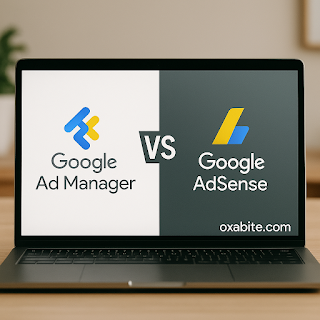Google AdSense vs. Google Ad Manager: A Comprehensive Guide
 |
| Google AdSense vs. Google Ad Manager: Which One Is Right for You? |
Google Ad Manager vs AdSense: Which One Fits a Professional Website in 2025
I’ve been managing ad inventory for several high-traffic websites, and I’ve used both tools in depth. Here's everything you need to know to make the right decision — even if you're not a tech expert.
💡 Why This Comparison Matters
Many new website owners jump into Google AdSense because it’s easy. But once traffic increases and your monetization strategy gets more complex, you’ll realize that Google Ad Manager (GAM) offers features AdSense simply can’t.
Whether you're monetizing a news portal, an affiliate blog, or a niche publication, knowing the difference between Ad Manager vs AdSense is crucial to your growth.
🧩 What Is Google AdSense?
Google AdSense is a simple ad network that allows publishers to monetize their content by displaying Google ads.
✅ Key Features:
-
Easy signup and setup
-
Auto ads and display ad units
-
No need to manage direct advertisers
-
Google handles bidding and payments
🎯 Best for:
-
Small to medium blogs
-
New websites with low to medium traffic
-
Publishers with no ad sales team
Keyword usage: adsense vs ad manager
🧠 What Is Google Ad Manager?
Google Ad Manager is a full ad server and inventory manager used by professional publishers who want more control over their monetization.
✅ Key Features:
-
Advanced ad targeting and segmentation
-
Header bidding integration
-
Management of direct campaigns and multiple ad networks
-
Precise scheduling, frequency capping, and reporting
🧪 My Experience:
When I started managing a site with over 100,000 monthly visitors, AdSense was too limiting. We needed to manage direct sponsorships, prioritize ad placements, and test demand partners — so we migrated to Google Ad Manager.
🆚 Google Ad Manager vs AdSense: Full Comparison Table
| Feature | AdSense | Ad Manager |
|---|---|---|
| Setup Time | Quick & simple | Complex & technical |
| Control | Limited | Full control over inventory |
| Revenue Sources | Only Google ads | Google + direct + third-party networks |
| Ideal Audience | New bloggers | Large publishers |
| Reporting | Basic reports | Granular reporting tools |
| Header Bidding | ❌ Not available | ✅ Fully supported |
| Direct Deals | ❌ No | ✅ Yes |
| Learning Curve | Easy | Steep (requires training) |
🔧 When Should You Use AdSense?
Choose AdSense if:
-
You’re just starting a blog or content site.
-
You don’t have technical skills or a developer.
-
You prefer a simple, low-maintenance monetization setup.
I used AdSense for the first 2 years of a niche blog I ran, and it worked well — until traffic passed 30,000 monthly visitors and advertisers started contacting me directly.
🚀 When Should You Switch to Google Ad Manager?
Use Google Ad Manager if:
-
You receive consistent traffic (ideally 50k+ monthly).
-
You want to maximize ad revenue through direct deals or multiple networks.
-
You plan to scale your business and need full control.
It’s not just about revenue — GAM gives you control. You decide what ads to show, when, and where. You can also rotate ads, create fallback chains, and protect user experience better.
🧠 Real-World Use Case: My Transition from AdSense to Ad Manager
In 2023, I managed a fast-growing content site with traffic jumping from 25k to 120k monthly users in 4 months. Initially, we used AdSense — but as brands started asking for direct placements and video pre-rolls, we couldn’t handle the demand.
We hired a freelancer to help set up Google Ad Manager and integrated with two programmatic partners (AdPushup and Ezoic). Within 30 days:
-
RPM increased by 40%
-
Bounce rate improved (thanks to better ad placement control)
-
We earned from both Google and direct campaigns
That flexibility was a game-changer.
📌 Frequently Asked Questions
❓ Can I use both AdSense and Google Ad Manager together?
Yes, you can link AdSense as a demand source inside Ad Manager.
❓ Do I need a developer to use Ad Manager?
Not necessarily — but setup is more complex. You might need help integrating ad tags or managing line items.
❓ Is Ad Manager better than AdSense?
Not for everyone. It’s better if you’re scaling up and want control. But for beginners, AdSense is still the best starting point.
Keyword usage: google ad manager vs adsense
🎯 Final Verdict: Ad Manager vs AdSense
-
Start with AdSense if you're a solo blogger or content creator.
-
Switch to Google Ad Manager once you hit consistent traffic and want advanced features.
📈 If your website is growing and you're serious about ad revenue, Google Ad Manager is worth the investment in time and learning.
📬 Read More
Need help choosing the right ad setup for your blog or site? I’ve written more guides on monetization tools, SEO for bloggers, and AI-powered productivity — all on Oxabite.com.

No comments
Post a Comment